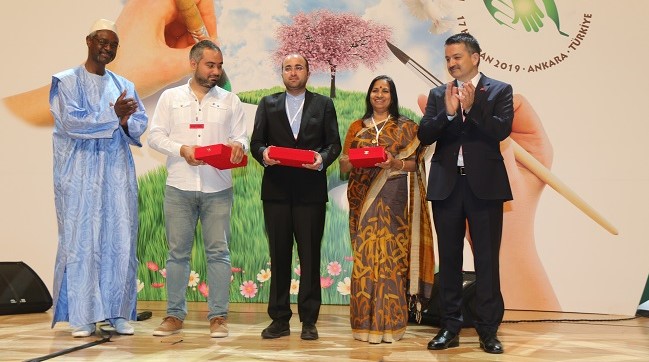The UN Secretary-General, António Guterres, has called for an urgent action to protect and restore the world’s degrading land in a bid to reduce forced migration, improve food security and address the global climate change emergency.

Guterres made the call in his message to the 2019 World Day to Combat Desertification and the 25th anniversary of the United Nations Convention to Combat Desertification (UNCCD) on Monday, June 17, 2019 in Ankara, Turkey.
The UN scribe who noted that the world was losing 24 billion tons of fertile soil and dry land to degradation, added that this had reduced national domestic product in developing countries by up to eight per cent annually.
Guterres also said that much remained to be done.
According to the UN scribe, the imperative of combating desertification is part of efforts to achieve the Sustainable Development Goals.
The international community adopted the Convention to Combat Desertification in Paris on June 17, 1994 out of concerns that “desertification and drought are problems of global dimension affecting all regions.”
In 2015, the international community also agreed to pursue a global target to ensure all countries work toward keeping a healthy balance of productive land by accelerating the recovery of lands that had been degraded , while avoiding and reducing land degradation.
Also, Ibrahim Thiaw, the Executive Secretary of UNCCD, said that the world’s only agreement should be binding on countries to tackle land degradation, desertification and to mitigate the effects of drought.
He said, “Our simple, everyday choices have a huge and enduring impact on the land, climate and biodiversity.”
The UNCCD head called for quicker and smarter individuals and professional choices “if we want our society, economy and environment to grow together.
“When only 20 per cent of the surface is habitable and one percent of freshwater is accessible to a global population that will reach nine billion in three decades; the simple, everyday choices we make to produce or consume goods ripple across our intricately interconnected lifestyles with incredibly long-term impacts,” he said.
According to him, one out of every four hectares of productive land has become unusable, while three out of every four hectares have been altered completely from their natural state.
Thiaw said that, under these conditions, increasing food production by 50 per cent, when land degradation and climate change will be decreasing crop yields by 50 per cent, makes restoring and protecting the fragile layer of land an issue for “anyone who wants to eat, drink or breathe.”
The World Day to Combat Desertification is celebrated every year globally on June 17 to promote good land stewardship for the benefits of present and future generations.
Turkey’s President, Recepp Tayyip Erdogan, was represented at the global observance celebrations by his Minister of Agriculture and Forestry, Bekir Pakdemirli.
The event was jointly hosted at The Congresium in Ankara by the Government of Turkey and UNCCD with ministers from 10 countries in attendance.
Some 196 countries and the European Union are parties to the Convention, of which 169 are affected by desertification, land degradation or drought.
The international community had in 2015 also agreed to achieve a balance in the rate at which land is degraded and restored by taking concrete actions to avoid, reduce and reverse land degradation, generally referred to as achieving land degradation neutrality (LDN), and mitigate the effects of drought.
In the last four years, 122 countries had committed to take voluntary, measurable actions to arrest land degradation by 2030. And 44 out of the 70 countries that had suffered drought in the past have set up national plans to manage drought more effectively in the future.
Thaw said that a significant amount of the land degradation and transformation had occurred over the last 50 years.
He stressed that the success stories of land restoration and conservation, such as in Turkey’s Central Anatolia region, offered hope that change would be possible when traditional knowledge, technology and faith communities come together creatively.
He said the restoration of 150 million hectares of farmland by 2030 could generate up to $40 billion in extra income for smallholders, feed another 200 million people and sink several gigatons of carbon dioxide.
Scaling it up across all our degraded land could prevent biodiversity and climate from disintegrating and bequeath new opportunities to the next generation, he added.
He warned, however, that urbanisation was a growing challenge because half of the global population now lives in urban areas and consumes resources produced in an area 200 times the size of the city.
“What is s more, regions such as Asia and Africa could lose 80 percent of their cropland to cities.”
He argued that restoring the two billion hectares of land that had already been degraded would help meet that growing demand from urban areas and create sustainable jobs and stabilise vulnerable areas.
Thiaw said the actions taken by countries in the context of the Convention showed that the world was determined to switch from destroying the earth to making it productive enough to grow a better future for everyone by 2030.
By Wale Ojetimi
